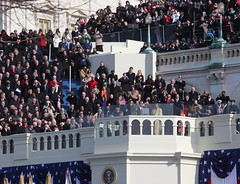President Obama Reaffirms his Commitment to Pursuing Peace with Iran
Though Iran wasn’t mentioned by name in Obama’s speech, he reaffirmed his commitment to the pursuit of a peaceful resolution to the Iranian nuclear impasse.
 [analysis] While much fanfare has been placed on President Barack Obama’s partisanship in his second inaugural address, not much attention has been placed on the foreign policy aspects of his speech, particularly from a US-Iran relations standpoint. Though Iran wasn’t mentioned by name in Obama’s speech, he reaffirmed his commitment to the pursuit of a peaceful resolution to the Iranian nuclear impasse when he stated:
[analysis] While much fanfare has been placed on President Barack Obama’s partisanship in his second inaugural address, not much attention has been placed on the foreign policy aspects of his speech, particularly from a US-Iran relations standpoint. Though Iran wasn’t mentioned by name in Obama’s speech, he reaffirmed his commitment to the pursuit of a peaceful resolution to the Iranian nuclear impasse when he stated:
“We will defend our people and uphold our values through strength of arms and rule of law. We will show the courage to try and resolve our differences with other nations peacefully – not because we are naïve about the dangers we face, but because engagement can more durably lift suspicion and fear.”
By making this statement, Obama conveyed two messages. He first underscored US resolve when stating that American values will be upheld through strength of arms, ensuring audiences skeptical of engagement that all options remain on the table in preventing Iranian nuclear proliferation, and he reaffirmed that the United States has “Israel’s back”. The second message was more promising to those advocating engagement. Obama highlighted the window of opportunity for diplomacy with Iran that he often claims exists when saying that the United States will try to resolve its differences with others peacefully and that engagement can lift suspicion and fear. The words “suspicion” and “fear” capture the essence of US-Iran relations rather accurately. Enmity has existed between the two governments since the genesis of the Islamic Republic over three decades ago. Scarring experiences such as the 1979 US Embassy hostage crisis in Tehran, Washington’s support of Saddam Hussein during the Iran-Iraq war, the US Marine Barracks bombing in Beirut and the USS Vincenne’s shooting of an Iranian airliner, had set the trend for mutual mistrust over the coming decades between the United States and Revolutionary Iran.
It’s fair to assume that the Obama’s statement encompasses US-Iran relations, confirming what had been opined to be his approach in dealing with Tehran in the start of his second term, which is pursuing a diplomatic solution to the confrontation. First by nominating Senators John Kerry and Chuck Hagel, both of whom support a pragmatic approach to dealing with Iran, to lead the State and Defense departments, respectively, and by iterating his commitment to resolving the United States’ differences with “other nations” peacefully during his second inaugural address, Obama signalled his intentions of pursuing diplomacy from the onset of his second term in resolving the Iran issue.
Obama’s diplomatic maneuverability will likely be time-limited when considering factors such as Iran’s own presidential elections, which will preoccupy Tehran for much of the spring; vocal opposition of US-Iran engagement by neo-conservatives and opponents of the Islamic Republic, such as the American Israel Public Affairs Committee and like-minded organizations; and when taking into account Israel’s “red line” and the re-election of Prime Minister Benjamin Netanyahu, who is unlikely to fundamentally shift Israeli policy toward Iran, though others believe the opposite. Obama’s diplomacy will also be highly dependent on whether the Iranian government puts in a sincere effort on its part. If diplomacy does not yield progress by late 2013, strenuous efforts at engagement by President Obama may be curtailed and may usher in a policy of containment, which John Kerry dismissed as US policy during his Senate confirmation hearing, or worse yet, it may pave the way for military intervention.
As mentioned elsewhere, the US and Iran have met bilaterally for a total of 45 minutes since 2009. To overcome three decades of fear and suspicion and for diplomacy to be successful, the dialogue must be sustained, regularized, bilateral, and be held in private. The discussion may benefit if it also included other regional security concerns such as Syria, Afghanistan, and Iraq, and issues such as counterterrorism, combatting drug trafficking, and human rights. Commonalities in these areas may be used as confidence enhancing measures that may lay the groundwork for an eventual negotiated settlement over the nuclear file.
The opinions here represent the author’s own.
Image: ‘President Obama, happy to be inaugurated’
flickr.com/photos/44124348109@N01/3212694835
Related posts:
Category: FOREIGN POLICY & SECURITY, MIDDLE EAST




